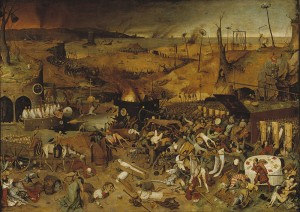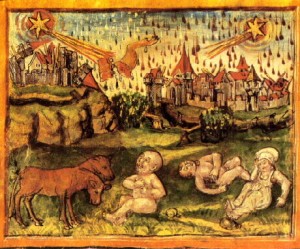Number three in our weekly series of Great Comets: The Comet of the Black Death, or Comet Negra. Hard to beat this one for dramatic impact.
The Comet of the Black Death is said to have coincided with the great plague, the “Black Death,” that killed half the population of Europe from 1346 to 1350. It’s believed that the plague originated in Central Asia and was carried along the Silk Road into Europe by fleas on rats.
Pieter Bruegel the Elder depicted the Black Death this way, in his 1562 painting “The Triumph of Death”:
There are other theories, too, about the origin of the Black Death. One says that a comet or fragments of a comet precipitated the Black Death. If the last Ice Age was caused by an asteroid impact, as some scientists believe, then it’s not much of a stretch to imagine that a piece of a comet striking the Earth could have disrupted the atmosphere enough to initiate the famines and plagues that characterized the Black Death:
“In France . . . was seen the terrible Comet called Negra. In December appeared over Avignon a Pillar of Fire. There were many great Earthquakes, Tempests, Thunders and Lightnings, and thousands of People were swallowed up; the Courses of Rivers were stopt; some Chasms of the Earth sent forth Blood. Terrible Showers of Hail, each stone weighing 1 Pound to 8; Abortions in all Countries; in Germany it rained Blood; in France Blood gushed out of the Graves of the Dead, and stained the Rivers crimson; Comets, Meteors, Fire-beams, corruscations in the Air, Mock-suns, the Heavens on Fire . . .”
You get the idea. (From A General Chronological History of the Air, Weather, Seasons, Meteors, Etc., by Thomas Short, 1749. London.)
That comet image, by the way, is really from a 1456 depiction of Halley’s Comet, as seen in the illustration below. I couldn’t find any images of the Comet of the Black Death. There was no one alive to paint one, apparently.


